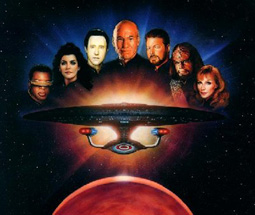Alien Minds and Cultures
Course:
PSYC/ANSO 2000: Alien Minds and Cultures
Professor:
Dr. Linda M. Woolf
Office Hours:
- By appointment, 301 Webster Hall
- Phone: 246-6970 or 246-7062
- woolflm@webster.edu
- Woolf Web Page: http://www.webster.edu/~woolflm/

Alien Minds and Cultures
Course:PSYC/ANSO 2000: Alien Minds and Cultures
Professor:Dr. Linda M. Woolf
Office Hours:
|  |
Readings:
To be provided by the captain (instructor) and fellow ensigns (students) in the class.
Course Description:
Are you a fan of Voyager? Would Deep Space Nine be your idea of an great vacation spot? Only seen one episode of the original series? Whether you consider yourself a Trekkie, Trekker, or neither, this course may be just the break you need from your normal routine. Star Trek often deals with topics from psychology, sociology, and anthropology such as sex, emotion, communication, aging, prejudice, cognitive and emotional disorders, evolution, and gender roles. In this course, we will examine the question of whether Star Trek gets it right or is it more fiction than science. So bring your popcorn and your human brains and we'll spend some time examining some of the behavioral and social science principles underlying the world of Star Trek.
Course Objectives:
- Objective: To become more knowledgeable about a variety of topics relevant to the behavioral and social sciences such as language and memory. To explore the strange, new worlds of scientific investigation which boldly engage the interest of psychologists, sociologists, and anthropologists!
- Objective: To examine how these topics are commonly presented and addressed in a specific television genre - in this case, Star Trek. Is it more science or is it more fiction? Inquiring Star Fleet cadets want to know!
- Objective: To further develop analytic and critical thinking skills. Spock should serve as your role model for this course objective. You will analyze and evaluate each episode in relation to the research literature. Did Star Trek get it right or get it wrong or something in between?
- Objective: To further develop written and oral presentation skills. You will write an analysis of one episode per week based on readings and discussion, present the research concerning one episode and lead a discussion following that same episode. Certainly can't expect a Star Fleet commission without these skills!
- Objective: To further devlop library research skills. You will find relevant research articles (not popular press) to provide and present to the class. Learn to navigate the computor console and surf through the psychology databases much like Data!
The class will meet on Tuesdays from 17:30 hours to 21:30 hours (5:30 - 9:30 p.m. for those without Star Fleet Academy training). One should arrive on-time, if not early, for all duty shifts and no duty shifts should be missed. In other words, attendance is required. Missed duty shifts (classes) will negatively impact your performance log (grade) and also will be reported to the Borg Queen. Don't let your collective down by missing your duty shift! Class Meetings:
Course Requirements:
An away-team report (presentation), five mission analyses, a final academy quiz, and duty shift attendance & participation.
All grades will be assigned on a scale of 0 - 100 with:
90 - 100 A,A- Superior work 80 - 89 B+,B,B- Good work 70 - 79 C+,C,C- Satisfactory work 60 - 69 D+,D Passing, but less than Satisfactory Less than 60 F Unsatisfactory
Percent of Grade:
Away-Team Report 20% Mission Analyses (4 recorded) 50% Final Academy Quiz 20% Duty Shift Attendance & Participation 10%
Away-Team Report - Each week, we will view the historic video logs of two Star Trek missions. Each video log highlights a specific alien mind/culture concern. Away-teams (students, in groups or individually) will be responsible for presenting the topic to the class (Media projection on the viewscreen is encouraged--Powerpoint). Additionally, away-teams will search the archives (library research journals) for articles to provide to the class. Use at least two articles from the following sources: PsycArticles, PsycInfo, or SocIndex) for information regarding this alien mind/culture concern. Away-teams will report to the class on the specificied alien mind/culture concern as well as provide relevant background readings. Away-team groups and mission topics will be assigned the first week of class. Once you have your assignment, search the archives! Get out your communicators and contact the captain. She will be able to provide background information and help direct your search. Discuss with her which articles you are thinking of distributing to the class. Articles must be approved by the captain, and sent in pdf format to the captain one week before your away-team report. These articles will be placed on eReserve and all ensigns must download and read these prior to class. Away-team reports are to be approximately 25-30 minutes in length. The away-team report will be graded on:
- Quality of the articles selected
- Background information included in the presentation
- Accuracy of information presented
- Clarity of presentation
- Effective use of presentation media
Don't be reduced to this! Complete all mission analyses on time and completely!
Mission Analyses - As stated above, we will view the historic video logs of two Star Trek missions each week. Ensigns are required to provide a written report concerning one mission from each week. Each report will include a discussion of the material presented by the away-team and the archival readings (journal articles). This report will also include a discussion of the research concerning the specific alien mind/culture topic and then analyze the historic video log (the Star Trek episode) for inconsistencies and inaccuracies in terms of presentation of this alien mind/culture topic. Each mission analysis will discuss whether the historic video logs are accurate or whether the data has been distorted/mispresented simply to manipulate the United Federation of Planets populations' sentiments (ratings). Each mission analysis will include a discussion of what was presented correctly and what was presented incorrectly. While you are required to submit five mission analyses, only four will be included in your final evaluation. Thus, the lowest grade will be dropped. The mission analyses will be graded on:
- Discussion of the topic and research in your own words
- Analysis of what the Star Trek episode got right
- Analysis of what the Star Trek episode got wrong or was distorted.
- Final conclusions about whether the episode was more science or fiction
- Quality of writing
- Appropriate use of APA format
Papers must be submitted electronically in Word (.doc, .docx, or .rtf) format to woolflm@webster.edu. Papers are due the Monday following the next class period. For example, the paper covering a Week Three topic is due the Monday of Week Four. All papers must be in APA format.
Final Academy Quiz - A final quiz will be given covering all of the material presented in class. Examination format will primarily be short answer. The questions will cover material from away mission reports (presentations), archival readings (the journal articles), and discussion. The final academy quiz will be worth 20% of your grade.
Duty Shift Participation & Attendance - As discussed previously, duty shift participation and attendance is mandatory. It is impossible to get the full away-team report or to view the historic video logs in context if one misses their duty shift. The technology presented to the right has not been found to be as effective as full duty shift participation. 
Plagiarism (attempting to pass off the work of another as one's own) is not acceptable. Plagiarism includes copying all or part of another's writings (even a single sentence), inappropriate paraphrasing, using another student's paper as your own, submitting a paper for more than one class. All papers will be submitted to the university's plagiarism database for review. Plagiarism, either intentional or unintentional, will result in a grade of 0 for that assignment and will be turned over to the appropriate university source for disciplinary action. In addition, cheating on exams will also result in the same fate.
Here are some Web sites that will help you avoid the problem of plagiarism particularly plagiarism resulting from paraphrasing too closely to the original source. -
- Establishing Authorship by Paul C. Smith, Alverno College
- How to Avoid Plagiarism Tutorial
- The University of Indiana's Online Plagiarism Tutorial - You can print out a certificate of completion!
Duty Roster
Week
Topic
Historic Video Logs
Week One Introduction to class Aging
The Deadly Years
Unnatural SelectionWeek Two No Class Go to the Library to research and work on your topics Week Three Prejudice Gender Roles
Let That Be Your Last Battlefield Outcast
Week Four Nature vs. Nurture Language
Suddenly Human Aphasia
Week Five Observational Research Ethics
Who Watches the Watchers
EthicsWeek Six Memory Dreaming
Retrospect Night Terrors
Week Seven Drug Addiction Holodeck (Internet) Addiction
Symbiosis Hollow Pursuits
Week Eight Life as a Fan Final Academy Quiz
Trekkies